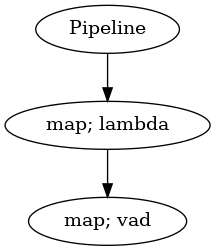Long Audio VAD
Contents
Long Audio VAD#
Let say you want to cut your realtime recording audio by using VAD, malaya-speech able to do that.
This tutorial is available as an IPython notebook at malaya-speech/example/long-audio-asr-torchaudio.
This module is not language independent, so it not save to use on different languages. Pretrained models trained on hyperlocal languages.
This is an application of malaya-speech Pipeline, read more about malaya-speech Pipeline at malaya-speech/example/pipeline.
[1]:
import malaya_speech
from malaya_speech import Pipeline
from malaya_speech.utils.astype import float_to_int
`pyaudio` is not available, `malaya_speech.streaming.pyaudio` is not able to use.
Load VAD model#
We are going to use WebRTC VAD model, read more about VAD at https://malaya-speech.readthedocs.io/en/latest/load-vad.html
[2]:
vad_model = malaya_speech.vad.webrtc()
[3]:
p_vad = Pipeline()
pipeline = (
p_vad.map(lambda x: float_to_int(x, divide_max_abs=False))
.map(vad_model)
)
p_vad.visualize()
[3]:

Starting malaya-speech 1.4.0, streaming always returned a float32 array between -1 and +1 values.
Streaming interface#
def stream(
src,
vad_model=None,
asr_model=None,
classification_model=None,
format=None,
option=None,
buffer_size: int = 4096,
sample_rate: int = 16000,
segment_length: int = 2560,
num_padding_frames: int = 20,
ratio: float = 0.75,
min_length: float = 0.1,
max_length: float = 10.0,
realtime_print: bool = True,
**kwargs,
):
"""
Stream an audio using torchaudio library.
Parameters
----------
vad_model: object, optional (default=None)
vad model / pipeline.
asr_model: object, optional (default=None)
ASR model / pipeline, will transcribe each subsamples realtime.
classification_model: object, optional (default=None)
classification pipeline, will classify each subsamples realtime.
format: str, optional (default=None)
Supported `format` for `torchaudio.io.StreamReader`,
https://pytorch.org/audio/stable/generated/torchaudio.io.StreamReader.html#torchaudio.io.StreamReader
option: dict, optional (default=None)
Supported `option` for `torchaudio.io.StreamReader`,
https://pytorch.org/audio/stable/generated/torchaudio.io.StreamReader.html#torchaudio.io.StreamReader
buffer_size: int, optional (default=4096)
Supported `buffer_size` for `torchaudio.io.StreamReader`, buffer size in byte. Used only when src is file-like object,
https://pytorch.org/audio/stable/generated/torchaudio.io.StreamReader.html#torchaudio.io.StreamReader
sample_rate: int, optional (default = 16000)
output sample rate.
segment_length: int, optional (default=2560)
usually derived from asr_model.segment_length * asr_model.hop_length,
size of audio chunks, actual size in term of second is `segment_length` / `sample_rate`.
num_padding_frames: int, optional (default=20)
size of acceptable padding frames for queue.
ratio: float, optional (default = 0.75)
if 75% of the queue is positive, assumed it is a voice activity.
min_length: float, optional (default=0.1)
minimum length (second) to accept a subsample.
max_length: float, optional (default=10.0)
maximum length (second) to accept a subsample.
realtime_print: bool, optional (default=True)
Will print results for ASR.
**kwargs: vector argument
vector argument pass to malaya_speech.streaming.pyaudio.Audio interface.
Returns
-------
result : List[dict]
"""
Start streaming#
[4]:
samples = malaya_speech.streaming.torchaudio.stream('speech/podcast/2x5%20Ep%2010.wav',
vad_model = p_vad,
segment_length = 320)
/home/husein/.local/lib/python3.8/site-packages/torchaudio/io/_stream_reader.py:696: UserWarning: The number of buffered frames exceeded the buffer size. Dropping the old frames. To avoid this, you can set a higher buffer_chunk_size value. (Triggered internally at /root/project/torchaudio/csrc/ffmpeg/stream_reader/buffer.cpp:157.)
return self._be.process_packet(timeout, backoff)
[5]:
len(samples)
[5]:
23
[6]:
import IPython.display as ipd
import numpy as np
[7]:
samples[4]
[7]:
{'wav_data': array([ 0.0458374 , 0.04632568, 0.0489502 , ..., -0.03302002,
-0.03625488, -0.02584839], dtype=float32),
'timestamp': datetime.datetime(2023, 2, 17, 0, 40, 4, 402398)}
[8]:
ipd.Audio(samples[4]['wav_data'], rate = 16000)
[8]:
